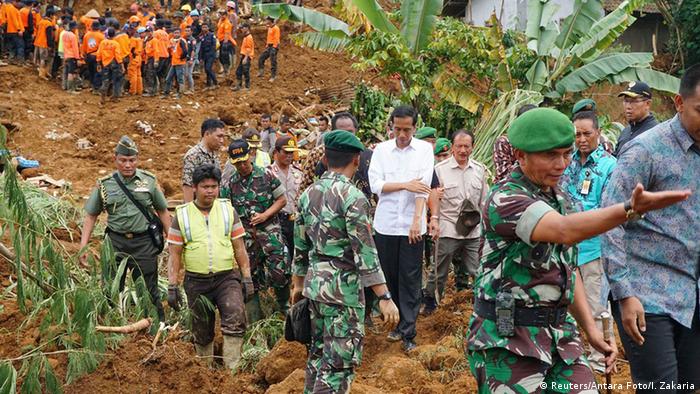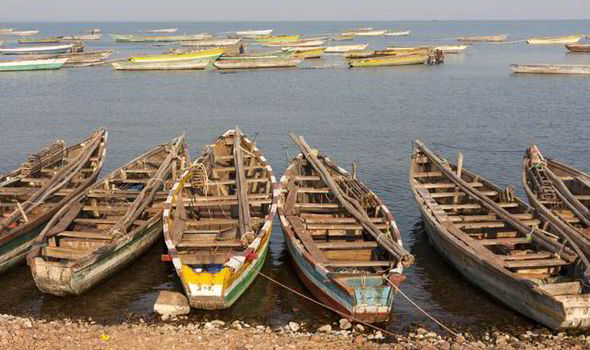
Rescue workers in Indonesia on Sunday continued their search for more than 70 people left missing after a mudslide two days previously buried 105 houses in the village of Jemblung in central Java.
"The rescue team has found 32 bodies ... and is still searching for 76 people buried in the landslide," National Disaster Management Agency spokesman Sutopo Purwo Nugroho said in a text message.
Sutopo said 25 of the victims had been identified, adding that more than 2,000 people were taking part in the search. Some 600 people had been forced from their homes and were being accommodated in temporary shelters at several locations, he said.
The ground around the disaster site is reportedly still unstable, forcing rescuers to be careful while digging for fear of causing more mudslides. Sutopo said that rescue teams had also been hampered by the fact that many roads and bridges were destroyed.
President Joko Widodo (seen above in white) visited the area on Sunday, and promised to relocate the people made homeless by the disaster. He also warned Indonesians to be "vigilant," saying that there were many other areas in the country where landslides were a likely event.
Friday's mudslide in the Barnjarnegara district, some 460 kilometers (285 miles) east of the capital, Jakarta, was triggered by three days of torrential rains.
About 2,000 rescuers, including soldiers, police and volunteers, were digging through the mud and the wreckage of crumpled homes, getting some relief from clear weather following days of heavy rain. Excavators, meanwhile, shoved aside earth and the remains of decimated wooden homes.
Residents of Jemblung village in Central Java province’s Banjarnegara district said they heard a roaring sound followed by the raining down of red soil that buried more than 100 houses late Friday.
“The landslide looked like it was spinning down,” said one resident, Subroto, who like many Indonesians uses only one name. “I managed to rescue a pregnant woman, but could not save the other man.” He said one side of the hill collapsed, then another. “In five minutes, there were three (major landslides) and they swept away everything,” Subroto said.
By late afternoon Sunday, 32 bodies had been pulled from the debris, while hopes faded that the 76 people still missing would be found alive, said Sutopo Purwo Nugroho, the spokesman for Indonesia’s Disaster Mitigation Agency.
Many roads and bridges were destroyed, hampering rescue efforts, Nugroho said.
Many people in Jemblung village said they were aware that the earth on the 150-meter (yard) hill that flanked their remote farming village may not hold. After hearing a deep rumbling sound just after dusk Friday, some fled to safer ground.
But others were either at home or at the local mosque when the mud, rocks and trees tumbled onto their village.
Wawan Wahyuni, a 20-year-old farmer, said he watched helplessly as his grandfather and dozens of his neighbours disappeared beneath mud more than 6 metres (20 feet) deep in some spots.
“I saw them buried alive,” Wahyuni said. “They were yelling ‘Allah Akbar! (God is great!) before being slowly buried.” Wahyuni himself was buried up to his chest until survivors rescued him seven hours later.
Banjarnegara is located on Indonesia’s most densely populated island of Java, about 460 kilometres (285 miles) east of Jakarta.
Seasonal rains and high tides in recent days have caused dozens of landslides and widespread flooding across much of Indonesia, a chain of 17,000 islands where millions of people live in mountainous areas or near fertile, flood-prone plains close to rivers.
Landslides caused by heavy rains and floods are common in Indonesia during the rainy season, which runs from November to March. The national disaster agency estimates that about half of the countriy's 250 million population lives in areas that are prone to landslides.
Sunday 14 December 2014
http://www.dw.de/death-toll-continues-to-rise-in-indonesian-landslide/a-18128112



